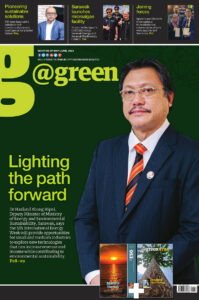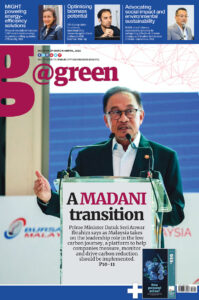Remaining committed Sarawak Energy will continue to build on sustainability, hydropower and regional ambitions
Sarawak Energy, Malaysia’s largest renewable energy developer and provider, recently shared its response to the impact of Covid-19 on its business operations while continuing to build a sustainable energy future for Sarawak and the region at the GO ESG ASEAN Corporate Sustainability Virtual Summit 2020.
The two-day summit themed ‘The Business of Recovering Better – A Resilient & Sustainable ASEAN by Design’, aimed to promote sustainability thinking and strategies as part of ASEAN’s economic reset post-Covid-19 by accelerating the adoption of Environmental, Social and Governance or ESG considerations among businesses.
Group Chief Executive Officer, Datu Sharbini Suhaili, spoke at a panel session titled “Corporate Leadership for the ASEAN We Want”, moderated by Nitin Jaiswal, Head of Government Affairs & Strategic Relations at Bloomberg LP, Asia Pacific.
Also on the panel with Sharbini were Corine Tap (Senior Vice President for Aqua Indonesia and Danone Waters SEA), Gunjan Soni (CEO for ZALORA) and Dr Pakorn Peetathawatchai (President of The Stock Exchange of Thailand).
Sharbini said: “It is essential to be agile and quickly adapt to crisis situations. Our primary focus is keeping the lights on for Sarawak throughout the Covid-19 pandemic.
“Our fundamental ambition to grow regionally as a provider and developer of renewable energy has not changed, although our delivery mechanisms and methods have transformed due to the restrictions in movement.
“The pandemic also catalysed change in the way we run our business – it accelerated our aspiration to be a digital utility by 2025 as well as our transition into flexible work arrangements.
“We took transformative steps in changing the way we work to remain efficient by learning to achieve a lot more with the same level of resources. We leveraged on technology to improve our business operations’ efficiency whilst reducing the number of staff on site.
“The latter has yielded some secondary benefits – our estimates show that the average reduction in carbon emission is 40kg per day for our HQ alone from the reduced commuting.”
Sharbini added the development of renewable and affordable hydropower in Sarawak supported the diverse application of alternative renewables like solar and hydrogen.
SEB was investing in Sarawak’s first large scale floating solar plant at their Batang Ai Hydroelectric Powerplant.
Meanwhile, their research into hydrogen and collaboration with Petronas would enable them to participate in future hydrogen value chain activities, contribute to a sustainable energy future, decarbonise their energy system. This will also augment what they were already doing hydropower to provide clean, renewable and affordable energy for Sarawak.
“Our main grid carbon intensity has decreased by 76.5 per cent since 2009 with the move into large hydropower generation, showing us the sustainability benefits gained from renewable hydropower over the past decade,” he concluded.
Good sustainability practices
Speaking at the closing ceremony of the 2-day summit, Ban Ki-moon, the 8th UN Secretary-General said Sarawak Energy was the first Malaysian company to become a signatory of the “Business Ambition for 1.5°Celsius” campaign, creating value for everyone.
“Its collaboration with UN Global Compact Malaysia & Brunei to launch the Small Medium Enterprise-Sustainable Development Goals (SME-SDG) Toolkit shows great corporate leadership and is a commendable effort to mobilise sustainability actors for SDG 17 – Partnership for the goals,” said Ban.
On the first day of the summit, UN Global Compact Malaysia & Brunei and Sarawak Energy launched the SME-SDG Toolkit for small and medium enterprises who want to incorporate good sustainability practice into their operations.
The free-for-use SME-SDG online Toolkit is a step-by-step guide and incorporates a suite of tools, manuals and other resources for SMEs to steer them towards a more sustainable business model.
Sarawak Energy Senior Manager for Sustainability, Mohamad Irwan Aman, also spoke at a panel session titled “Sustainable Business Strategies the ASEAN Way – From HOW to NOW!” along with Pratima Divgi (Director for Hong Kong, Southeast Asia and ANZCDP, CDP), Esther An (Chief Sustainability Officer for City Developments Limited) and Maria Victoria Tan (Head of Group Risk Management and Sustainability for Ayala Corporation).
The session, which was moderated by Sarimah Talib (Head for Sustainable Development Management from Petronas), discussed how businesses implemented their sustainability agenda in the face of a global pandemic and how sustainability risks could impact an organisation.
“Our commitment to sustainability grew stronger during the pandemic, and it could be seen throughout the entire organisation,” Irwan shared.
“Every organisation runs into different issues in their sustainability journey. We believe the way forward is through reliance on the sustainability community, where sharing good practices and developing strategic alliances amongst organisations will go a long way to help progress sustainability agendas.” — @green








